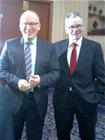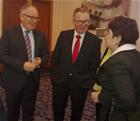Europe Must Choose to be Forrest Gump or Jack Sparrow
Ralitsa Kovacheva, January 16, 2012
Frans Timmermans is a member of the Dutch Parliament and spokesman on foreign policy of the Labour Party group. Previously he was Secretary for European Affairs in the coalition government of Jan Peter Balkenende (2007-2010). He is also an University professor and a lawyer. Mr Timmermans is running for Commissioner for Human Rights of the Council of Europe and is on a tour in the region in a search of support for his candidacy. During his visit in Sofia he delivered a public lecture, organised by the Atlantic Club in Bulgaria.
We can choose to be Forrest Gump and believe that life is a box of chocolates - some are good, others we may not like. But we can also choose to be Jack Sparrow who "looks beast in the eye. He goes beyond that to attain what he wants to attain." So the next generation must "have the audacity to be Jack Sparrow."
 Thus, in cinematic terms, Frans Timmermans presented the alternatives facing Europe and its citizens. He is convinced that Europe has no choice but "on the basis of more European integration, on the basis of more European economic integration, on the basis on one true European foreign policy to be a player on world level." We should pool our resources as Europeans in order to be masters of our fate, the Dutch MP said.
Thus, in cinematic terms, Frans Timmermans presented the alternatives facing Europe and its citizens. He is convinced that Europe has no choice but "on the basis of more European integration, on the basis of more European economic integration, on the basis on one true European foreign policy to be a player on world level." We should pool our resources as Europeans in order to be masters of our fate, the Dutch MP said.
At the same time, he is aware that "this is not a popular presentation in many European nations”, in his own Netherlands too. "One of Europe’s most persistent ghosts, persistent devils for centuries, has reappeared again – this is the old European ‘blame game’. […] This blame game is now played against minorities, against generations, against other European nations. And I believe that people of good will all across Europe have the highest responsibility in the finding an antidote against that ever occurring ghost." And the political tools to fight that ghost are well known: rule of law, human rights and democracy.
For politicians it is difficult to explain to voters why they should give billions to rescue Greece and at the same time cut spending on social security, health and education: "People do believe that other Europeans are only out there to take away our wealth." And how we got here after decades of prosperity? Paradoxically, one reason is rooted namely in the greatest achievements of European integration - peace and prosperity. Two generations after the EU was founded, people take this situation for granted, as a natural state. But "democracy is not a natural state," we should be aware of "fragility of Europe, fragility of our democracy, fragility of our prosperity, fragility of rule of law," Mr Timmermans recalled. These are achievements that we must maintain, because "everything that is built can also be broken down."
And the other reason, according to Mr Timmermans, is the lack of knowledge about  Europe. People think that when something works well then we do not need to know about it. That was the understanding of the European Union so far and I am sorry that there was not appropriate education in schools, so people understand how the state, the society, the European Union works, he admitted. That is why now all just say that Europe does not work and it is a bad thing. That is why they fear that other Europeans will take away their wealth, that is why they want the return of national borders.
Europe. People think that when something works well then we do not need to know about it. That was the understanding of the European Union so far and I am sorry that there was not appropriate education in schools, so people understand how the state, the society, the European Union works, he admitted. That is why now all just say that Europe does not work and it is a bad thing. That is why they fear that other Europeans will take away their wealth, that is why they want the return of national borders.
Mr Timmermans knows how sensitive the topic is to Bulgaria, given the Dutch veto on Romania's and Bulgaria's entry into the Schengen area. As a lawmaker from the opposition Labour Party, however, he has a different position than the official one: "I simply do not agree with the position of the Dutch government on the issue." He said the Dutch government made a mistake not accepting the compromise proposed by the Polish Presidency for a phased adoption of the two countries in Schengen. As a lawyer I know that arrangements must be respected, “the deal is a deal”, Frans Timmermans said.
As a lawyer, he expressed his concerns regarding the intergovernmental agreement, the so-called "fiscal pact", which is currently being negotiated by the European governments. "This treaty is messy on many many levels and I as a lawyer hate messy treaties," he said (see more on this topic in the interview given by Mr Timmermans to euinside - in the video). According to him, "the interests of smaller member states are best served if the community method is applied as largely as possible." This means the European Commission to have exclusive right of initiative and decisions to be made between the Council and the European Parliament: "If we put all the emphasis on the European Council and all the decision-making in the European Council, we will create an unnecessary resistance in many states against necessary measures." The Community method is the most effective way to have a balance between large and small countries, between North and South, between East and West.
 And while the current opposition in Europe is North-South, here in Bulgaria we feel quite well that Western and Eastern Europe still do not fully belong to each other. Mr Timmermans is also clearly aware of this fact, noting that people in Eastern Europe experience their ostalgie (from German: ost-east, nostalgia for life under socialism), while in Western Europe people have their westalgie (from German: west - west). Their common misbelief was that after the fall of the Iron Curtain and the reunification of Europe Eastern Europe will become like Western Europe.
And while the current opposition in Europe is North-South, here in Bulgaria we feel quite well that Western and Eastern Europe still do not fully belong to each other. Mr Timmermans is also clearly aware of this fact, noting that people in Eastern Europe experience their ostalgie (from German: ost-east, nostalgia for life under socialism), while in Western Europe people have their westalgie (from German: west - west). Their common misbelief was that after the fall of the Iron Curtain and the reunification of Europe Eastern Europe will become like Western Europe.
While listening to Mr Timmermans's words, I am thinking that maybe now, 20 years later, the West and East have a second chance to make another step towards each other. Because we have to learn a common lesson: nothing is given and everything depends on the choices we make. A lesson that Western Europeans have forgotten, and the Eastern Europeans have yet to learn.
*Characters from the movies "Forrest Gump" and "Pirates of the Caribbean"